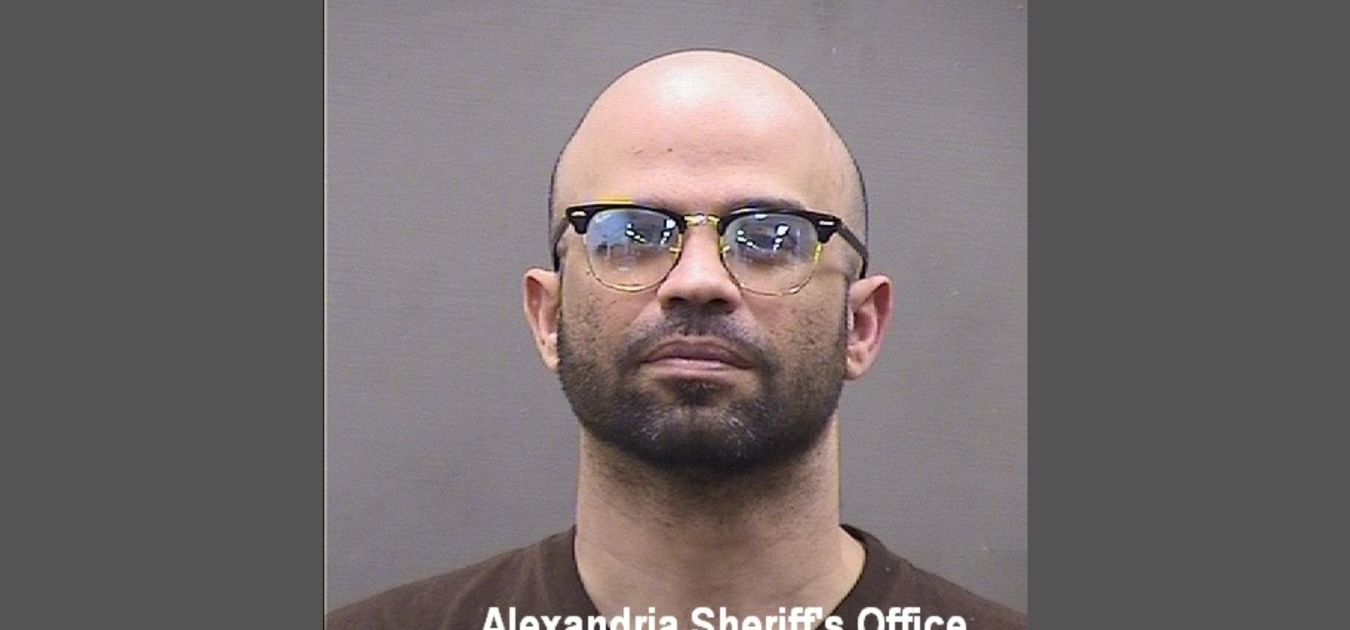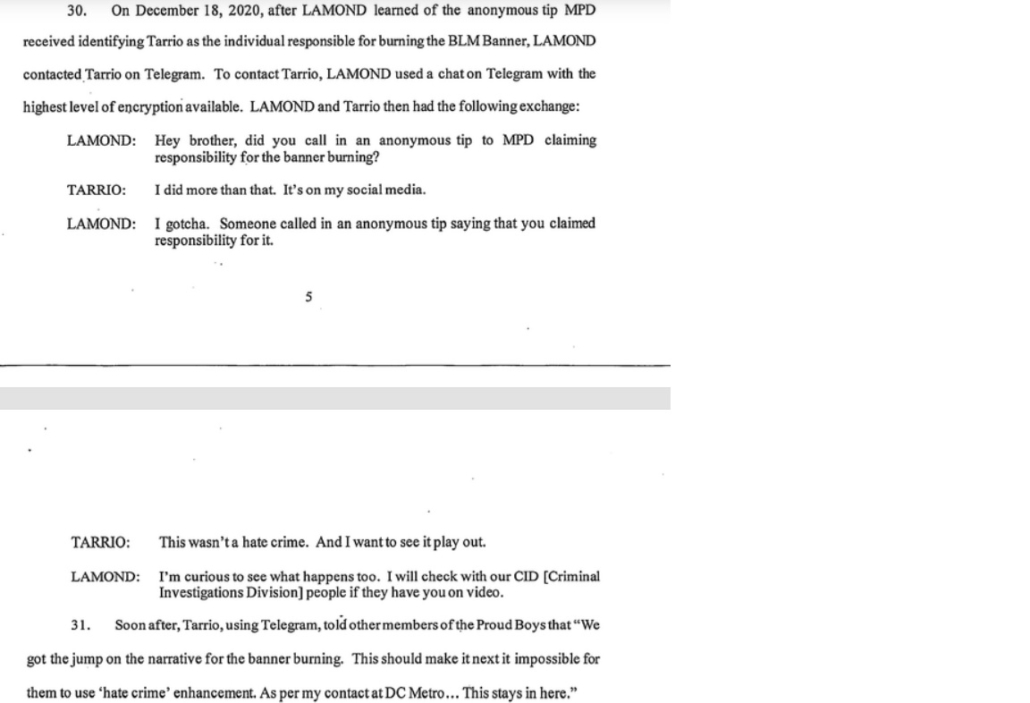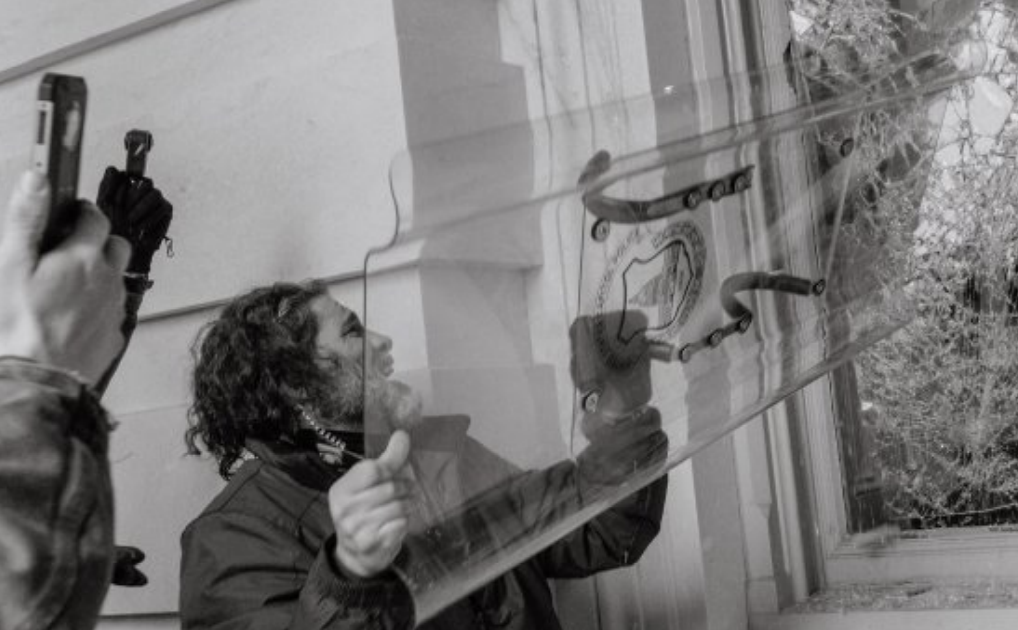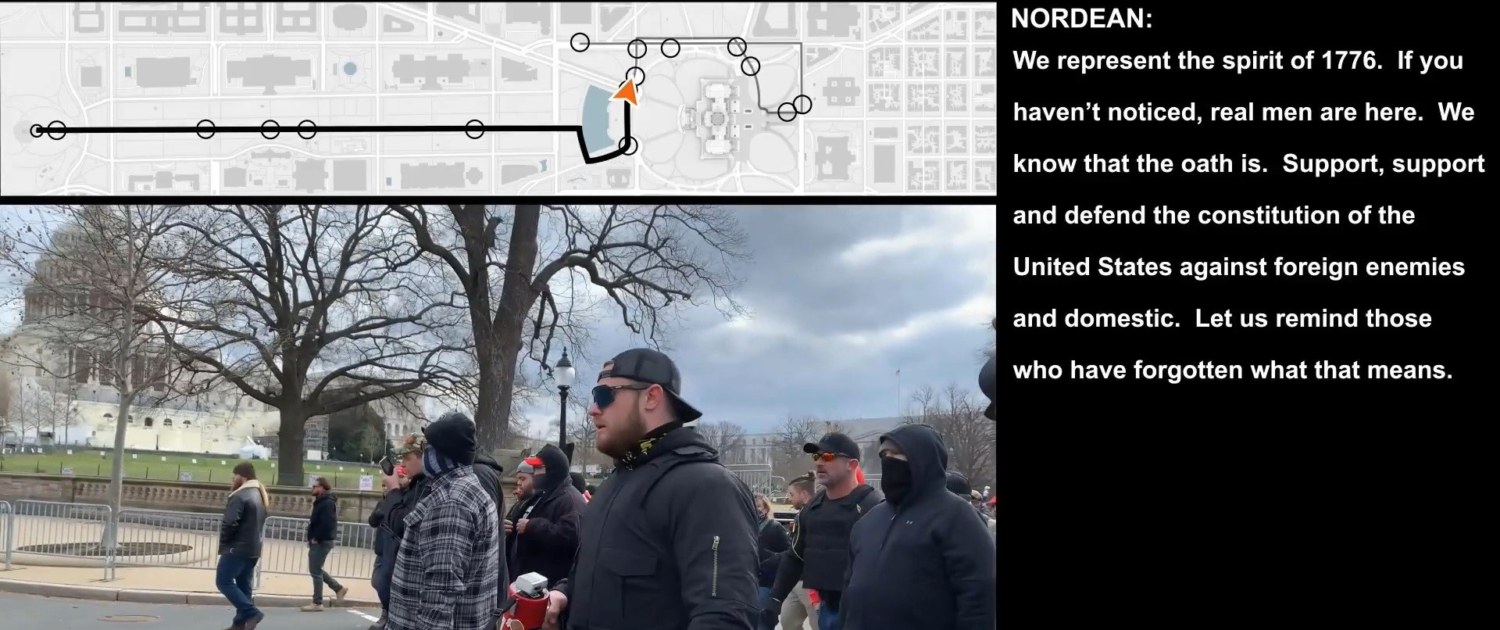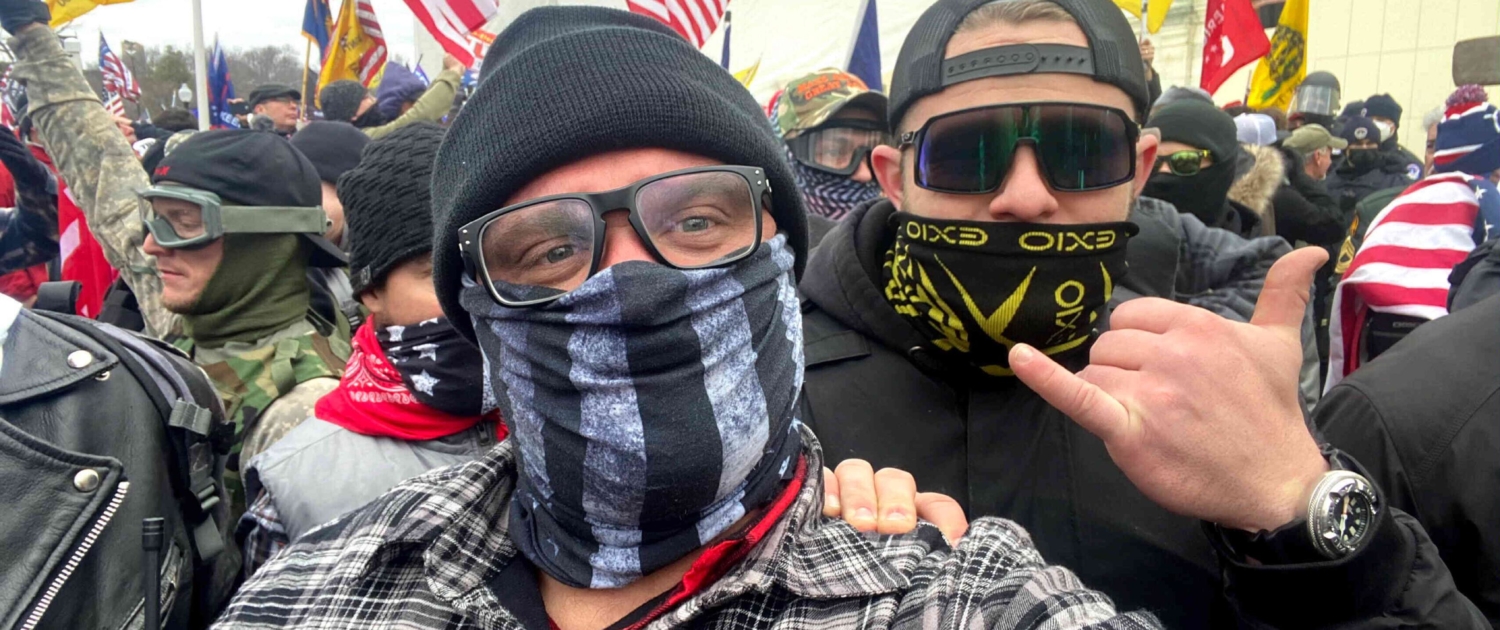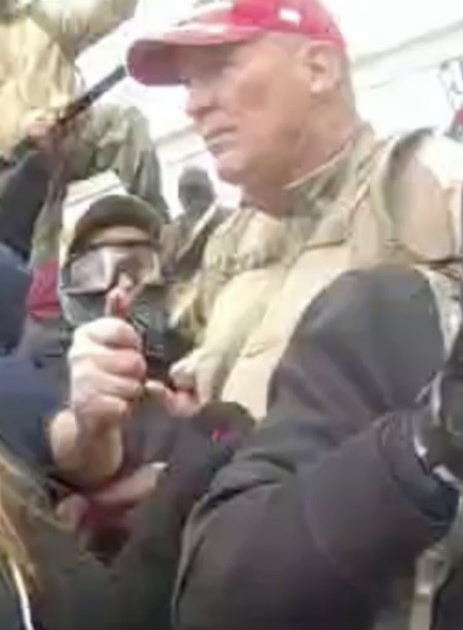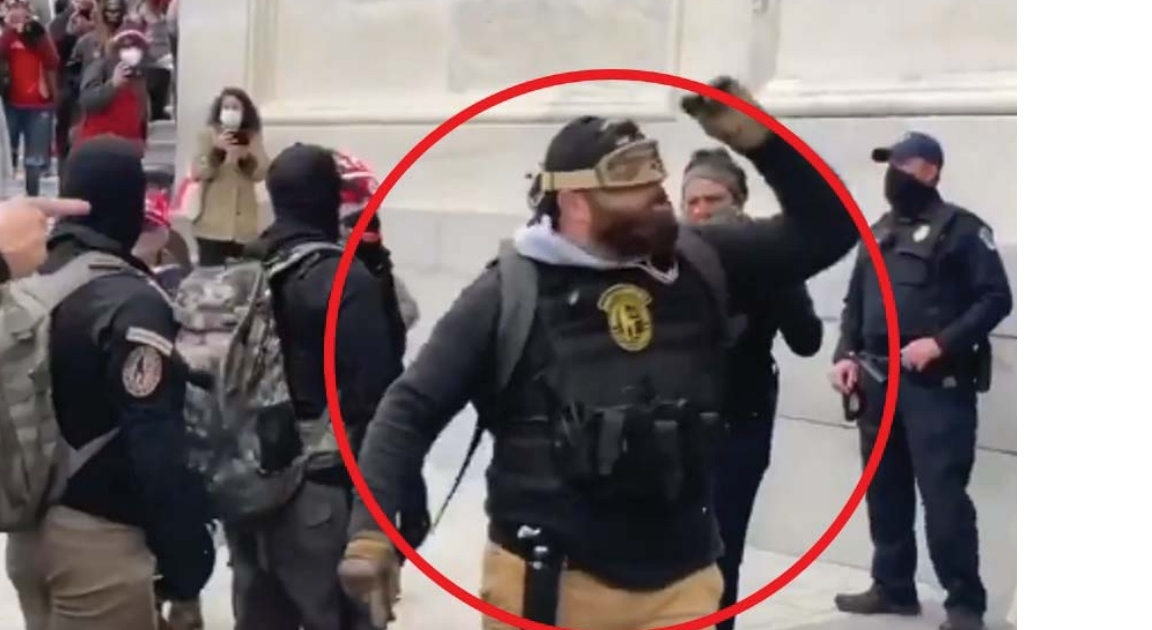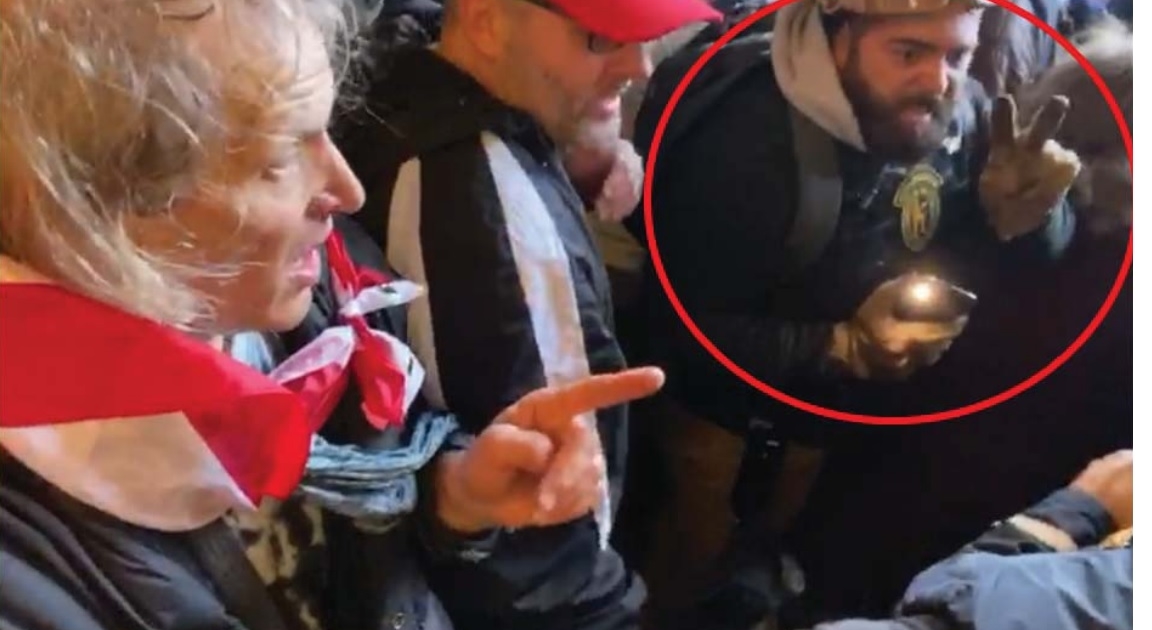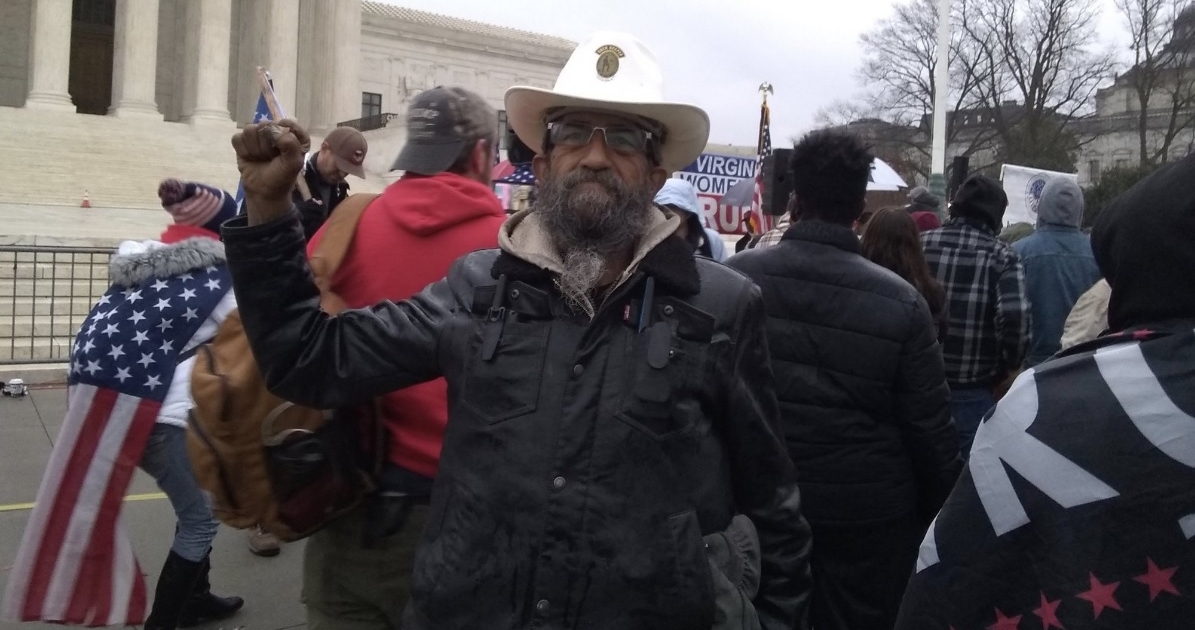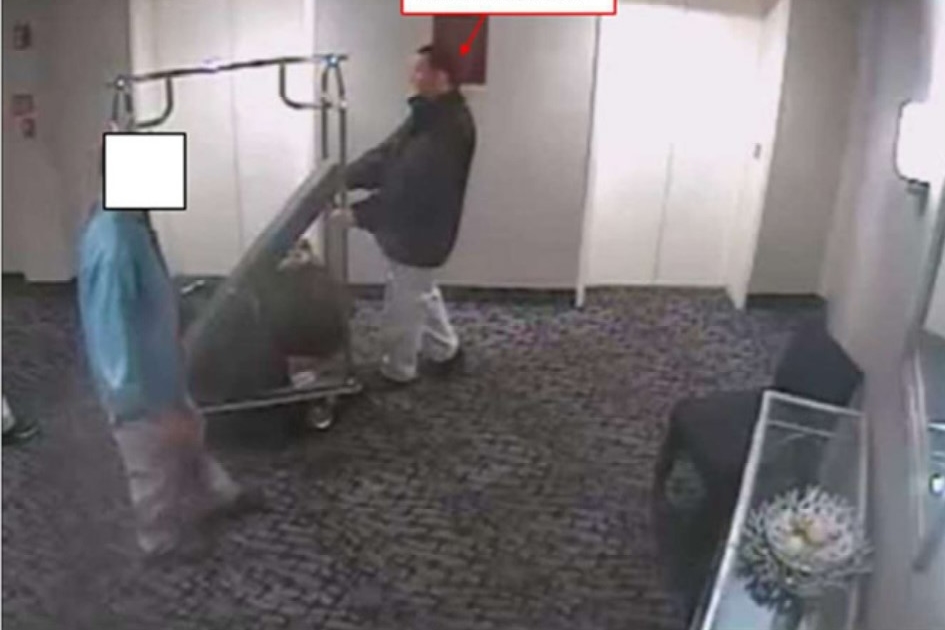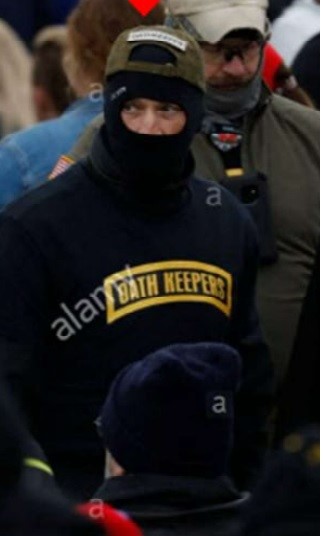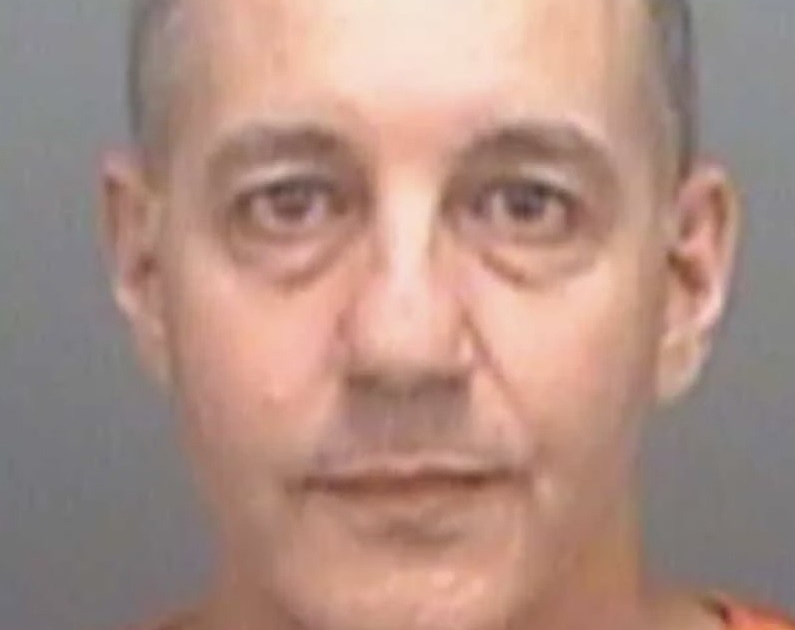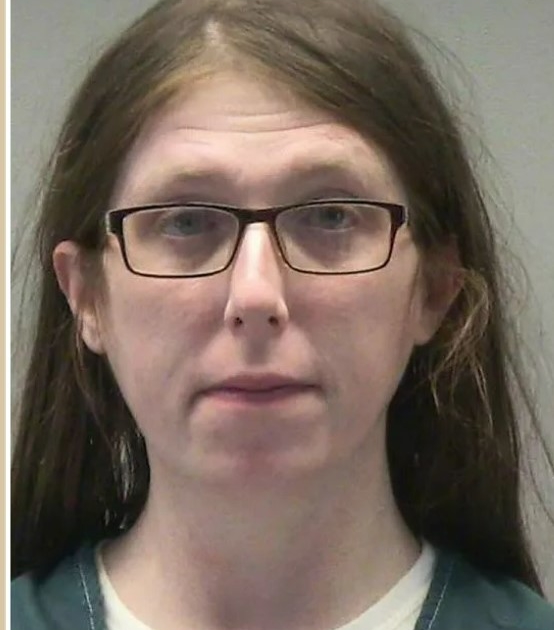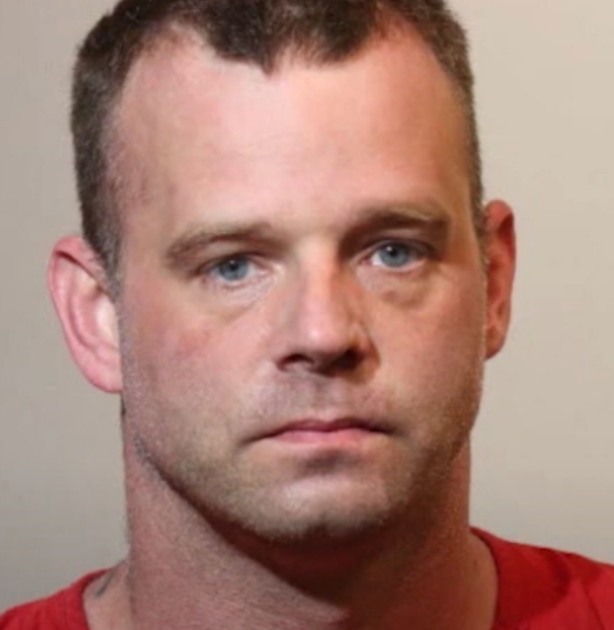NOTE: Emptywheel is again supporting Brandi Buchman’s coverage of the Proud Boys hearings live from the courthouse in Washington, D.C. Please consider making a donation to emptywheel as she continues her reporting through the final Proud Boys sentencing hearing for Henry “Enrique” Tarrio scheduled for Sept. 5. If you can and are able, you can also support Brandi’s work as a freelance journalist directly here.
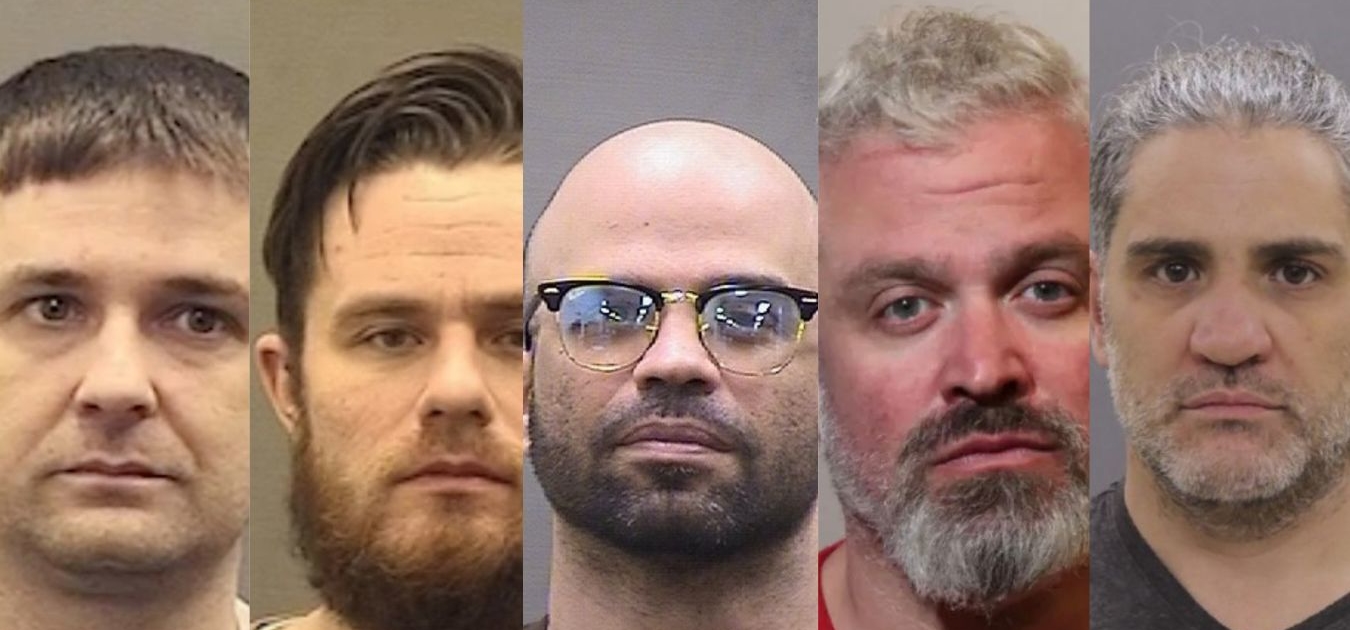
From left to right: Proud Boys Zachary Rehl, Ethan Nordean, Henry Tarrio, Joseph Biggs, Dominic Pezzola
Like moths to a flame, many of the Proud Boys sentenced to prison last week for their roles in the seditious conspiracy to stop the peaceful transfer of presidential power on Jan. 6, 2021, appear unwilling or unable to disabuse themselves of the delusions that have led them to exactly where they are today: inside cells, donning jumpsuits or shackles and ordered kept away from the free world and their families for no less than a decade apiece.
Dominic Pezzola, a New York Proud Boy and former Marine who busted open a Senate wing window allowing some of the first rioters to stream inside the Capitol, and forcibly stole a riot shield from a police officer knocked to the ground who believed he would die at the hands of the mob, strode out of a federal courtroom last week shouting “Trump won!” as he pumped
his fist in the air.
Remarkably, less than an hour before receiving his 10-year sentence – the government wanted 20–, Pezzola had begged the court for mercy through tears and vowed he was done with politics.
Joseph Biggs, a former Marine now disgraced with the conviction of seditious conspiracy and a multitude of other felonies, called into a vigil held outside a jail heavily populated by Jan. 6 defendants in D.C. just a few days after he was sentenced to 17 years in prison. The government wanted 33.
“This is just insanity. There is no way in hell any of this stuff can stick. There’s no way you can give somebody terrorism for shaking a fence,” Biggs, a former contributor to Alex Jones’ far-right conspiracy theory peddling InfoWars, railed. “That’s the most insane fucking thing in the world. First, it starts with shaking a fence and what’s next? You shake a hand or accidentally bump into somebody and that’s terrorism… We gotta stand up and fight. And never give up. 17 years? They can kiss my ass. We’re still fighting all the way to the end.”
Biggs then asked the same lawmakers he terrorized nearly 1,000 days ago with a mob of Trump supporters at his back and roughly 200 Proud Boys in the crowd overall, to “get their heads out of their asses” and help free him.
But Trump didn’t win and Biggs wasn’t sentenced to 17 years for merely shaking a fence in the course of peaceful protected protest.
His efforts to bring that fence down, which was bolted inches deep into the steps leading to the Capitol, were done with force and with the implied intent to stop Congress from certifying the election. That forethought was bolstered by the intent and actions of his co-defendants, including Washington state Proud Boy chapter leader Ethan Nordean.
This was decided not just by a jury able to discern evidence clearly enough to evince distinctions between defendants and therefore reach acquittal on some counts, but it was also a point sustained by U.S District Judge Tim Kelly, a Trump appointee. He and the jury defined the Proud Boys’ efforts as an attempt to directly intimidate or coerce the United States government and its officers from doing their duty and initiating the democratic transfer of power.
For the foreseeable future, the Proud Boys and certainly Joe Biggs have appeared to pin all of their hopes for freedom on a pardon from a reelected Donald Trump in 2024. Notably, during an appearance with Alex Jones on InfoWars, Jones – who helped organize the Stop the Steal rally before the attack and who is currently waiting to learn whether $1.4 billion in damages he owes to victims of Sandy Hook will be discharged in bankruptcy – extended an open invitation to Biggs to return to his show.
Biggs gushed and Jones reassured the jailed insurrectionist he was merely a “patsy.” Perhaps in hopes of inspiring fundraising levels, he urged Biggs to “give me a 1776!!”
“1776 brother!” Biggs laughed.
***
At the E. Barret Prettyman courthouse last week, Pezzola, Biggs, Nordean, and their co-defendant, Philadelphia Proud Boy chapter leader Zachary Rehl, were each sentenced by Judge Kelly following their convictions by a jury trial that lasted four months. The only Proud Boy left for sentencing is the group’s leader, Henry “Enrique” Tarrio. He will be sentenced on Tuesday at 2 p.m. ET. The government seeks 33 years for him.
Prosecutors sought 20 years for Pezzola, he was given 10. They sought 33 years for Biggs, he was given 17. Nordean faced a 27-year recommended sentence but received just 18 years, matching Oath Keeper founder Elmer Stewart Rhodes for the stiffest sentence yet handed down to any of the extremists charged and convicted of seditious conspiracy.
The Justice Department sought 30 years for Rehl, and Kelly sentenced him to 15, noting as he rendered his decision how the son and grandson of Pennsylvania police officers perjured himself blatantly on the stand more than a dozen times as he denied – despite clearly visible footage of him – pepper-spraying police who were battling to keep the Capitol under the control of the U.S. government.
Yet, it seems increasingly unlikely that the judge will venture into those high climbs and may instead deliver a sentence closer to what Nordean and Rhodes received.
Given their tenor at trial and their mostly self-serving apologies that comprised their remarks before learning their fates, it would also seem things are today not very much different than they were for the Proud Boys in the fall of 2020 or that first fateful week of 2021.
Their minds are heavy still with toxic propaganda. Their egos remain front and center and from their mouths, they continue to sputter drivel echoing a lie told by a man that, for whatever reason they appear unable to fully grasp even now, has helped pave the road to their ruin and continued suffering.
***
ETHAN NORDEAN
To his credit, before he was sentenced, Nordean at least correctly called Jan. 6 a “tragedy.” And he at least offered an apology “for my actions that day and to anyone who I directly or indirectly wronged,” he said.
But he also qualified those remarks and others. What he regretted the most, he told the court, was “not being a better leader” on Jan. 6, speaking nothing of all the times in the lead-up to the day that he failed to disavow fellow Proud Boys in private messages of their violent notions or how he actively recruited men to come with him to Washington.
In court, he said it took him time to “humble” himself and to “accept my situation,” as the trial unfolded, he told Judge Kelly.
“I thought of myself merely as an individual, removing blame and accountability for myself… [but] I had to face a sobering truth. I came to Jan. 6 as a leader; I came to keep people out of trouble and keep people safe,” he said.
Still deflecting responsibility, omitting discussion of how he vilified police and effectively couching his crimes in the language and context of a well-intended general who merely lost control of an unforeseeably mutinous troop, he nonetheless maintained that he tried to “deescalate.”
U.S. Capitol Police Officer Shae Cooney testified at trial in February that it was Nordean who screamed at her, calling her a “pig” as he whipped people up into a frenzy and knocked over the metal fencing that allowed the mob to rush past her. She and other officers near her were beaten with “thin blue line” flags, pelted with frozen water bottles, knocked down and nearly trampled, and doused in chemical spray.
“I had ample opportunity and I did nothing. There is no excuse for what I did… adding myself to a chaotic and dangerous situation in the Capitol building was sorely irresponsible,” Nordean said Friday, his voice clear and even.
Unlike all of his co-defendants at sentencing so far, the Jan. 6 ground leader did not appear to cry.
Before he sentenced him, Kelly told Nordean that what disturbed him was not just Nordean’s actions before and on Jan. 6, but afterward, too. Nordean expressed regretting nothing and when there was talk among Proud Boys of going further, of possibly ramping up for another Jan. 6-style takeover in the days after the attack, he didn’t back down. Not before the inauguration. Not after.

In a text message on Jan. 12, 2021, Proud Boy Ethan Nordean defends his efforts “on the ground.” (Source: DOJ Trial exhibit)
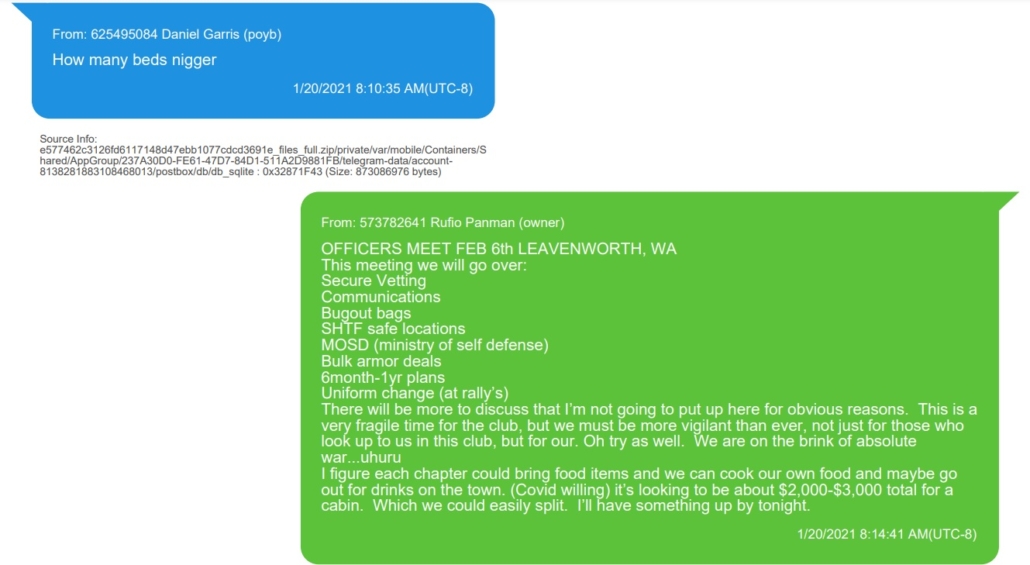
In a text message from Jan. 20, 2021, Ethan Nordean discusses plans moving forward for Proud Boys in the “fragile time” after Jan. 6. (DOJ trial exhibit)
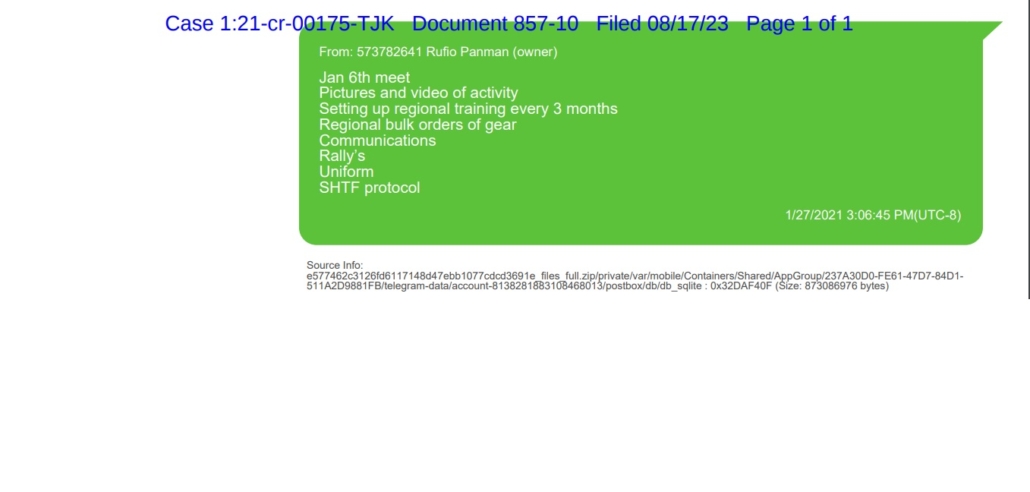
Proud Boy Ethan Nordean (aka Rufio Panman) text message from Jan. 27, 2021, discussing preparing the group for its next move. (DOJ trial exhibit)
Nordean’s attorney Nick Smith argued for leniency and at one point contended that while Jan. 6 was regrettable, the charge of seditious conspiracy didn’t fit because what the defendants did only really amounted to something in the category of a national embarrassment. The subsequent crimes that sprang forth should be deemed more humiliations to a branch of government and nothing more. Kelly entertained Smith briefly but was sharp on the singular point appearing lost on the defense: the Proud Boys’ actions culminated at a crucial, positively critical constitutional moment. Early last week, Kelly denied all requests for acquittal and retrial.
“If we don’t have the peaceful transfer of power in this country, then we don’t have anything,” Kelly said, his voice slightly exasperated.
The novelty of Smith’s arguments aside, Kelly fell back on what Nordean said and did. It was Nordean who suggested Proud Boys “fash the fuck out.” They understood too, he said, that Jan. 6 was “the day that was the last stop on the train to make sure their preferred candidate stayed in power.”
Calling for terrorism enhancements to apply to Nordean’s sentence, Assistant U.S. Attorney Jason McCullough underlined that Nordean was the figure all other Proud Boys turned to in the fray. Witnesses for the prosecution who pleaded guilty to seditious conspiracy testified to this. Evidence and testimony showed how he stepped in when Tarrio, the organization’s founder, could not. (Tarrio was arrested before the raid on the Capitol but watched from afar.)
Nordean marched side by side with Rehl, and Biggs, and it was Nordean, McCullough noted, who recruited and “seduced men like Dominic Pezzola [with the idea] that violence is the answer.”
Judge Kelly would apply a terrorism enhancement to some of the charges at sentencing. The judge said he did not believe the defendants intended to kill anyone on Jan. 6. He also remarked that he would “probably never sentence someone 15 years below the guideline in my entire career.” The recommended sentences, he added, seemed to “overstate” the crime.
When she delivered her victim impact statement ahead of sentencing, U.S. Capitol Police Officer Shae Cooney broke down at the lectern. Through her sobs, she recalled how she lost a friend that day.
“Someone who I worked with for almost three years, I was standing right next to him when we started fighting and later that night he was gone,” Cooney said, referring to fallen Officer Brian Sicknick through choked-back tears. “Every day we have to be reminded he’s not here anymore because the people in this courtroom decided they weren’t happy with how an election went and their best idea was to break into the Capitol, fight police officers, and overturn an election.”
“We understand people were upset and angry. We tried to talk to them as best we could to show we understood they were angry and whatnot, and that this was not going to fix anything… it didn’t matter how much talking we did that day. There were too many people that just wanted to keep going and get through us as much as possible,” Cooney said.
So many people have taken their lives because of what happened to them on Jan. 6, she told the court.
Metropolitan Police Officer Jeffrey Smith killed himself after Jan. 6. Fellow Metro Police Department officers Gunther Hashida and Kyle DeFretag died by suicide. U.S. Capitol Police Officer Howard Liebengood also committed suicide four days after Jan. 6.
Officer Sicknick died after suffering multiple strokes following his confrontation with rioters.
JOSEPH BIGGS
At his sentencing, Biggs told the court that his “curiosity got the better of me” on Jan. 6. All of his violent rhetoric was just that – talk. It was a way for him to cope, he said.
Last week, when cuddling up to Judge Kelly and before he said the Justice Department could “kiss his ass” when speaking to supporters gathered at the D.C. jail, Biggs told the judge he respected the process and outcome though he freely admitted he would appeal.
“I don’t have any grudges toward any of you. I don’t hate the prosecutors. I prayed for all of you. I’m going to leave this situation a better person,” Biggs said, his speech rushed and his emotions high as he spoke.
He continued: “I had time to think about who I am and who I want to be with all my time in solitary confinement… I don’t want to be a person affiliated with any more groups unless it’s my daughter’s PTA.”
Biggs went on to claim that the assault of his daughter by someone he knew had twisted him up in the run-up to the insurrection. He also claimed that after Jan. 6, that was his “last time” with the Proud Boys and he had planned to tell everyone he was “done.”
Crying, Biggs pleaded: “I’m not a terrorist. I don’t hate people.”
But, Kelly told him, he did play a role leading people and riling others up against lawmakers and police. He was instrumental in the Proud Boys’ so-called “Ministry of Self Defense” and Biggs for weeks was key in leading operations for the channel that acted covertly to coordinate efforts for the 6th.
It was Biggs who wanted to find “real men” to “get radical” with and it was Biggs’ overt calls for violence and civil war that littered the group’s private and public correspondence. It was Biggs whom Tarrio turned to and whom Tarrio told members he relied on, along with Nordean, to make decisions. And when it finally came to it, it was Biggs, Kelly said, who helped yank down the fence and wave people inside with an intent to intimidate Congress.
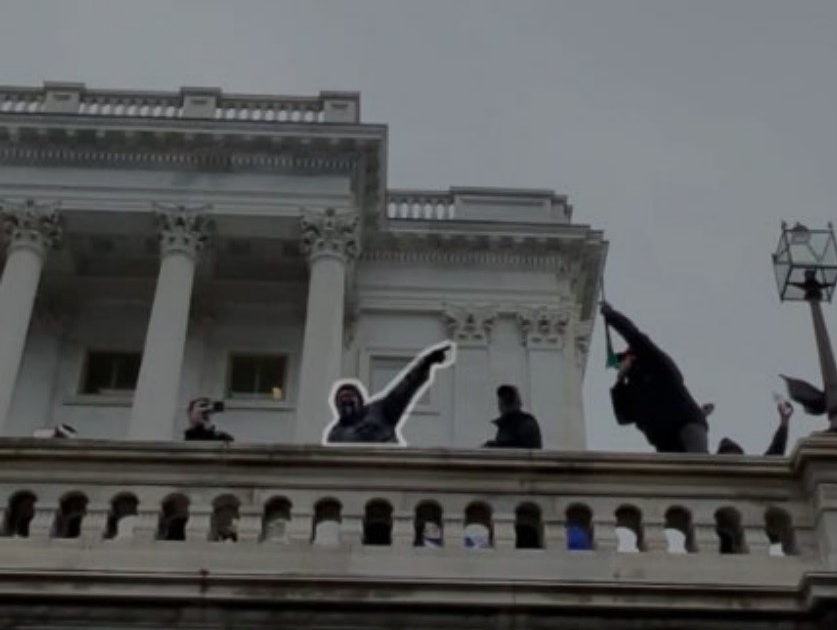
Proud Boy Joe Biggs is seen gesturing to rioters below, indicating where a nearby opening is for those to come inside the Capitol. (DOJ trial exhibit)
Biggs was the only Proud Boy to breach the Capitol twice. He saw officers fighting for their lives and brushed past them at the Columbus doors. He took a selfie once inside and stole an American flag as he marauded through the building.
“You waved people in. You entered the Senate gallery and made comments afterward that justified and celebrated what happened,” Kelly said.
A terrorism enhancement would apply to the charge involving the metal fence, the judge was quick to distinguish, because its removal was integral to rioters advancing and getting inside the Capitol. But he was shy to label Biggs a terrorist in the general sense.
“It’s not my job to label people a terrorist and my sentence today won’t do that. There are sentencing guidelines here that talk about adjustments and departures for conduct and then lay it out and label it terrorism and my job is to apply this. You asked me not to label you a terrorist, that’s for other people to argue about,” Kelly said.
Prosecutors warned the judge in their sentencing memo: “A conviction for serious felonies, and the accompanying substantial prison sentence, might unfortunately only redouble Biggs’s commitment to embracing extreme measures to achieve his political aims. The Court must accordingly impose a sentence long enough to prevent Biggs from leading another violent conspiracy against the government while he is still motivated and equipped to do so.”
In court, McCullough told the judge the Proud Boys, especially with leaders like Biggs at the helm, brought the nation to the “edge of a constitutional crisis” because that was precisely what they set out to do. Buildings may not have been bombed, mass casualties may not have occurred, McCullough argued, but the Proud Boys created an atmosphere on Jan. 6 that has yet to dissipate.
People are afraid to go to polling places or inaugurations for fear of political violence, he said. (In fact, threats and harassment of poll workers are up according to a recent study by the Justice Department.)
The Proud Boys didn’t need weapons of mass destruction, McCullough said.
“It just takes slick propaganda in an environment where you can encourage people to basically say it’s you against them,” he said.
Before Biggs was carted out of the courtroom by a marshal, Kelly told the parties he would have imposed precisely the same sentence had the terrorism guideline not applied.
“I know this is not the outcome you wanted or the government either,” Kelly said. “But I wish you the best of luck in your relationship with your daughter moving forward. I’ll just say that. I think it’s an appropriate sentence but I do wish you the best of luck with your daughter.”
ZACHARY REHL
Of all the Proud Boys to face sentencing last week, it was Rehl who became the most undone after prosecutors laid out their request.
“Zachary Rehl deserves every day of the sentence the government has requested for him here [of 30 years],” Assistant U.S. Attorney Erik Kenerson said Thursday.
Rehl helped “raise an army” of Proud Boys who shared in his belief that the 2020 election was stolen and that the only means of recourse to stop the transfer of power was to put a halt to proceedings on Jan. 6, Kenerson said.
“What is particularly pernicious in this conspiracy is the glorification of violence… the willingness to brawl in support of their cause to achieve results they could not otherwise,” the prosecutor emphasized.
Rehl looked at “vigilante violence” as a means to an end and when he recruited members to the Proud Boys, it was the most violent footage of their ideological or political opponents being brutalized that he tapped. He endorsed violence as just one piece of the strategy to “take back the country” and had been doing so since as far back as 2019 when he first started to associate with the group, Kenerson said.
Though the son and grandson of police officers, Rehl nonetheless encouraged violence against law enforcement when he advanced on the Capitol and then used violence to break a standstill on the Capitol’s West Plaza by assaulting an officer with pepper spray, Kenerson said.
At trial, prosecutors destroyed Rehl’s testimony after a series of questions emerged about his whereabouts on the West Plaza as well as what codefendant he was or wasn’t in contact with as he breached the building.
An intense exchange under cross resulted in Rehl melting down spectacularly and stumbling through a series of denials – to a mind-boggling degree – over footage played in court that depicted a man who looked and dressed identical to Rehl down to every detail spraying an irritant right at an officer.
Kenerson, who unwound Rehl at trial like so much thread from a spool, recalled how the Proud Boy’s testimony was “combative, evasive, and incredible.”
And it was. At one point, Rehl asked a jury to believe that he and others who stormed the Capitol did so because they thought stages were erected on the plaza for them, like at a rock concert. He was even unwilling to concede to prosecutors that the black glasses on the man that appeared to be him were in fact black and not, as Kenerson pointedly asked him during a tense minutes-long volley, pink?
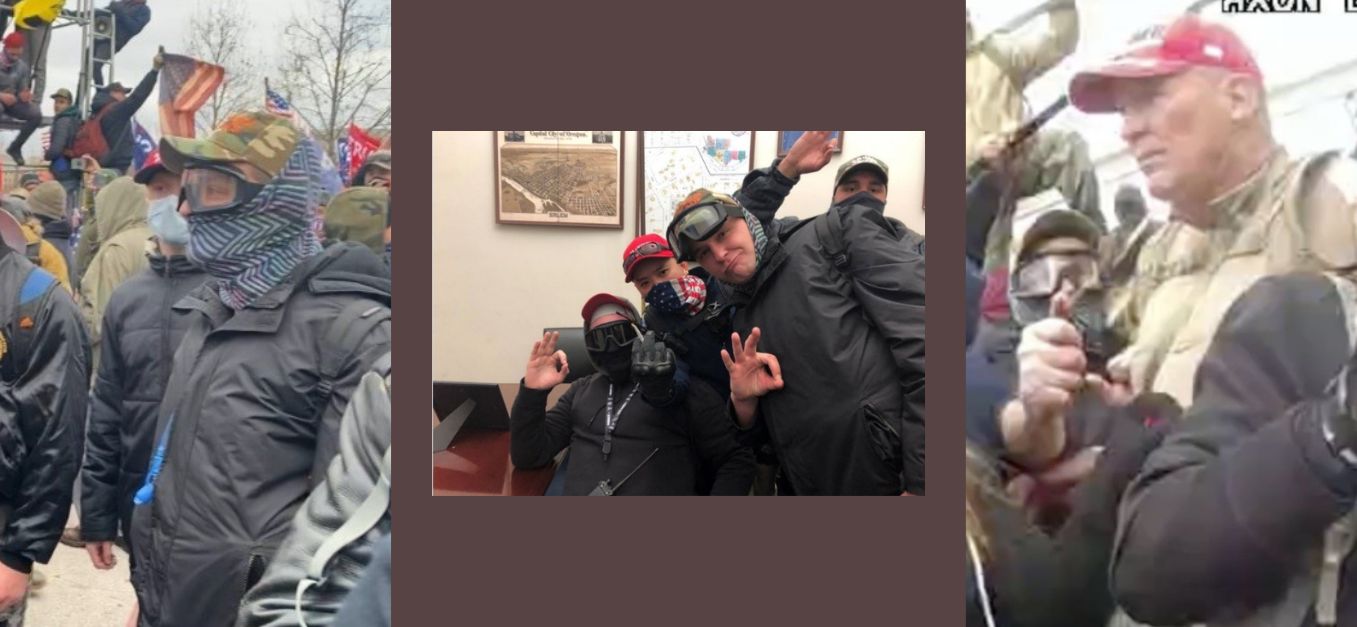
From left to right: DOJ trial exhibits show Proud Boy Zachary Rehl outside the Capitol on Jan. 6, 2021; taking a selfie inside a lawmaker’s office and spraying a chemical irritant at a police officer
Since the trial ended, Rehl continued to mock proceedings and not just that, but lie about them, Kenerson noted to Judge Kelly. That included when Rehl falsely told the Gateway Pundit in a post-trial interview that the trial was under a media blackout.
Last week, as he prepared to receive his sentence and read from his remarks, Rehl’s body was wracked by waves of tears, each of his words punctuated or paused by a sniff or a guttural clearing of his throat. He originally had a 10-page statement written out, he said, but on the advice of his counsel, Norm Pattis, he opted to focus “on what’s important in this room: my daughter and wife.”
Rehl told them he let them down and, that seeing them in court was difficult but the circumstances were his fault.
“A complete lapse in judgment cost me everything,” he sobbed.
Pattis lay a hand on Rehl’s back as his client lamented that his daughter would now lose his military benefits. He worried it may “still be a possibility” that he could lose more people in his life. He apologized to prosecutors for “blaming them” instead of himself for how things turned out.
Crying hard, he sputtered: “I am done peddling lies for people who do not care about me.”
He called Jan. 6 “despicable.”
“I did things I regret,” he said.
Like Nordean, Biggs, and Tarrio, Rehl was convicted of seditious conspiracy, conspiracy to obstruct an official proceeding, obstructing an official proceeding, conspiracy to prevent officials from discharging their duties, impeding officers during a civil disorder, and destruction of property.
In the weeks before Jan. 6, Rehl was involved with Tarrio’s brainchild, the group’s exclusive “Ministry of Self Defense.” After the attack on Congress, Rehl told members “We should have held the Capitol.” He said he was proud of what he accomplished yet frustrated more hadn’t been done. It was Rehl who called for firing squads for people who “stole” the election.
“‘Everyone should have showed up and taken the country back,’” Judge Kelly said in court on Thursday, reciting Rehl’s own words after the insurrection back to him.
“I mean my god!” Kelly exclaimed.
Rehl’s statements were “chilling,” he added.
Pattis urged the court to believe that Rehl was another casualty in the nation’s political discourse and had been swept up in the “crisis of legitimacy in this country.”
Rehl believed Trump when he said the election was stolen and fell for it “hook, line and sinker,” Pattis said.
The defense attorney has argued this point in court yet also wiles away his time on social media sharing things like Trump’s appearance with Tucker Carlson on Twitter late last month or suggesting Trump’s own looming trial dates are politically timed with the coming primaries and election.
DOMINIC PEZZOLA
But for the fact that he was acquitted of the topmost charge of seditious conspiracy and that he failed to play a significant leadership role among the Proud Boys, the 45-year-old Rochester, New York man might have received a sentence closer in line with his co-conspirators. Instead, he was sentenced to 10 years in prison.
Pezzola has already told supporters he thinks he will be out in one.
The image of Pezzola busting open a Capitol window with a stolen police riot shield wielded above his head is one of the most memorable images of Jan. 6.
And Pezzola has always been out front, according to prosecutors.
Tarrio first put Pezzola out front on his social media a week before the insurrection as a “literal poster child” for their organization, McCullough said, stamping an image of a warrior-like Pezzola with the hashtag, #LordsofWar #J6. Pezzola didn’t have a huge social media footprint but would often reply to Tarrio’s posts online rapidly. He also made it to the cover of The Washington Post when attending a pro-Trump rally in November.
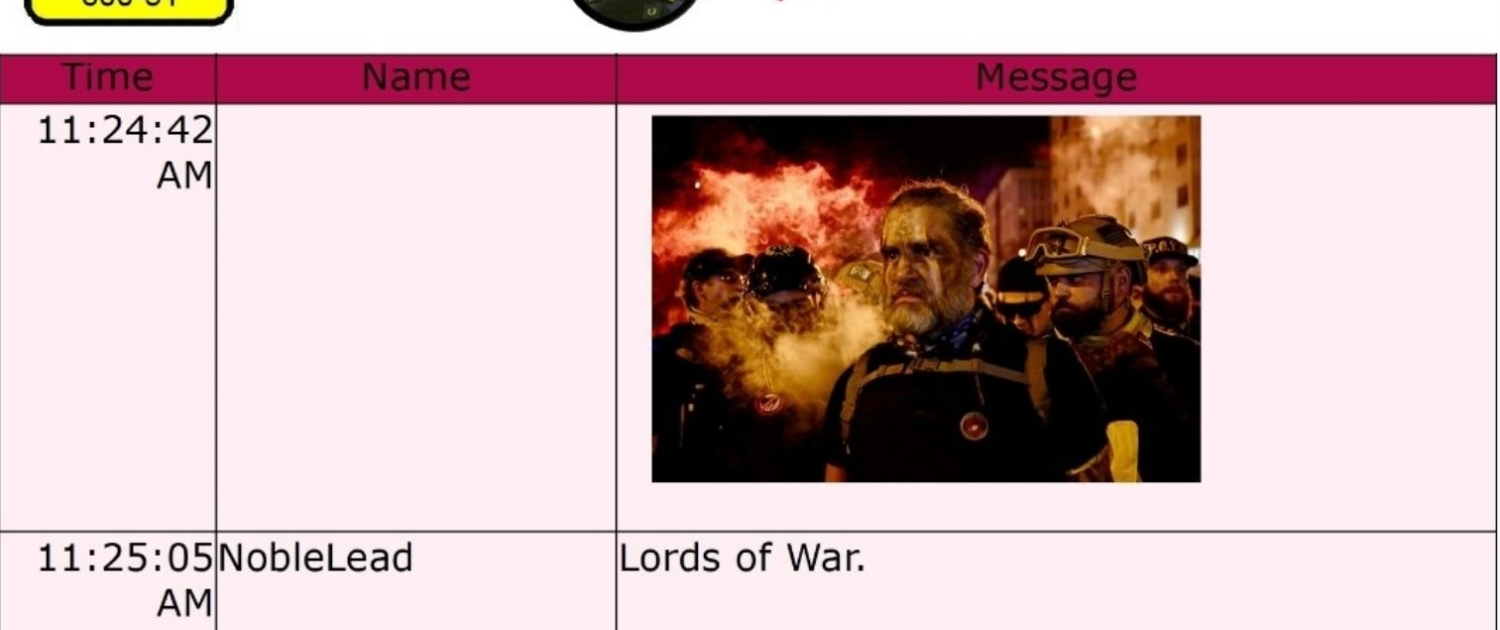
Pezzola had proven himself to the Proud Boys at a Stop the Steal rally in D.C. the following month and was taken into the fold in short order thanks to a vote of confidence from Jeremy Bertino, a Proud Boy who would plead guilty to seditious conspiracy in October 2022.
Once inside the Capitol, he celebrated with a victory smoke. And if there were questions over the depth of his involvement in the greater seditious conspiracy, the jury at least found this video damning enough of his involvement in the conspiracy to obstruct,
“I knew we could take this motherfucker over if we just tried hard enough,” Pezzola said in a selfie video he filmed inside the Capito less than 20 minutes after he powered through police, glass, and a crushing mob.
Kenerson told Kelly this was precisely the sort of violent political activity that Pezzola wanted to be a part of when he joined the group in 2020.
When he took the stand, Pezzola was arrogant and combative with prosecutors under cross-examination and offered half-apologies and concessions. He told them he took the riot shield from U.S. Capitol Police Officer Mark Ode out of fear for his own safety. He quibbled over whether he had pulled the shield away from Ode; he suggested at another point that Ode “lost” it in the scuffle. He blamed police for the violence of the day and he made himself out to be a defense and weapons expert.
At sentencing, Pezzola’s attorney Steven Metcalf sought to seek credit for his client’s “accepting of responsibility” for some of his crimes when he was on the stand.
But Kelly was not persuaded.
“And at the end of the day, even before we get to his testimony, well, he did take the stand and he did testify that there was no conspiracy. You’re entitled to that I suppose, but the jury convicted him of conspiracy. Not seditious conspiracy, but conspiracy. It makes it hard to waltz in and say, I should get acceptance of responsibility,” Kelly said. “I don’t think in his trial testimony he took responsibility for robbing or assaulting Officer Ode and he was convicted of those things as well.”
He credited Metcalf for the “creative” argument but rendered Pezzola’s “acceptance” as performative.
Addressing Pezzola, Kelly said: “You really were in some ways, the tip of the spear that allowed people to get into the Capitol.”
“You opened the Capitol like a can opener,” Kelly remarked.
Nonetheless, the judge departed downward on the sentence because he believed, as he did with the other defendants, that the terrorism enhancement overstated the Proud Boys’ conduct. They didn’t mean to cause massive loss of life, he said.
Speaking to the court before he was sentenced, with his mother, daughter, and wife crying behind him, Pezzola was emotional.
“I stand before you a changed and humble man,” he said before promptly ignoring what the court had ruled earlier. “But nonetheless a man who has always taken responsibility for his actions.”
He apologized to his wife for “magnifying” their personal life to the public. He apologized to his daughters for missing milestones. Mercy, he told the judge, would make or break his family. Pezzola’s wife, Lisa Magee, who was unable to speak a word without crying, told the judge she wasn’t making excuses for her husband but she noted, “As I said on the stand, he’s a fucking idiot.”
Her life had been turned upside down because of her husband, she said. Their children were ashamed to show their faces or reveal their names to strangers.
Pezzola’s 19-year-old daughter begged the judge to look at her father, extending her arm to and pointing in his direction across the court where he sat clutching a wad of tissue. Pezzola’s face was flush red, and he wiped tears away. He gave her a good life, she said. She never got in trouble and that was thanks to him, she said. His mother, sobbing through her statement, told the judge “I know my son” and called him “my hero.”
Before he sentenced Pezzola, Kelly repeated to him a speech he delivered to each of the defendants.
“The peaceful transfer of power is one of the most precious things we had as Americans. Notice I said had because our tradition of unbroken peaceful transfers of power – that string has now been broken. We can’t just snap our fingers and get it back.”
Pezzola had his eyes cast down on the table as Kelly spoke.
After he stood to accept his sentence but before he declared “Trump won!” and threw his fist in the air, a wry smile creeping across his face, he turned to his family in the pews to look at them. Whether he realizes it fully or not, it may have been one of the last times, in a very long time, that he sees them without bars or thick glass obstructing his view.
